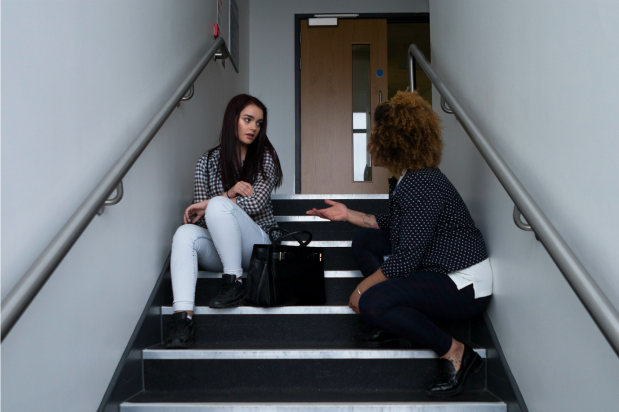Teens and young adults cope in a variety of ways when it comes to dealing with the hardship of growing up. Whether it’s puberty, peer pressure, cyber bullying or dating complications, they need to know they’re not alone in their struggle. Some of them cope by shutting down emotionally, seeking adrenaline, or using drugs and alcohol. They remain oblivious to the fact that the most effective way to deal with their problems is by opening up to trusted confidant.
If you’re a teen or young adult struggling with drug or alcohol abuse issues, depression, or other types of hardship, know that there are people who can help. It’s also important that you understand that there’s no shame in reaching out for support; it doesn’t make you weak nor does it mean you can’t handle your own life. On the contrary, asking for help is actually a sign of maturity and fortitude.
Here’s a list of the top people and resources you can turn to when you feel the need the need for support.
1. Your Doctor
Many teens and young adults tend to overlook their doctor as a source of guidance but he or she can actually prove to be a wealth of information. A major part of medical school is spent studying not only an individual’s physical health but also mental and emotional health.
So when your doctor asks about your drug and alcohol habits, know that this is part of your confidential medical records and that it’s pivotal that you answer honestly. This way, your doctor can identify if any of your past or current substance use is related to any symptom you may be experiencing.
Doctors, however, will require payment for their services. Ask if your insurance provider covers mental health services. Otherwise, you may need to pay a fee that can range from sliding scale to very expensive.
2. Your Teacher
Another valuable resource available to students are their teachers. Teachers are trained to be on the lookout for students who may be victims of abuse, exhibiting suicidal or self-harm tendencies, or students appearing to be the victims of bullying. Should a teacher see a student in trouble, they are required to intervene and make the appropriate school administrators aware of the problem immediately. Teachers also form a very special and personal bond with their students since they spend about 8 hours a day with them 5 days out of the week.
But while teachers will respect a student’s right to privacy, they are at liberty to report any information should the student prove to be a threat to themselves or others. Typically, he or she will work to obtain consent from the student in order to further collaborate with the appropriate staff to further serve the child’s well-being.
3. Your School Guidance Counselors
One of the most valuable aspects of reaching out to a trusted adult counselor is that they provide students with confidentiality, meaning whatever you say, by law, must be kept between only you and the counselor. They are employed to provide a listening ear, sound guidance and further resources to any student going through an emotional or mental struggle.
Therefore, students who may be worried about their parents finding out about their problems can rest easy. The only time a counselor is allowed to disclose any information is discussed in your sessions is if you express a desire to hurt yourself or others. Then, they are required by law to notify the police and the targeted party.
4. Your Parents
Parents can be tough for some adolescents to turn to because some teens feel their parents just won’t understand. As a teen seeking help, it is important to be truthful with yourself in terms of whether or not you feel comfortable turning to your parent for help. If you’re not, there are other helpful adults you can reach out to.
With that said, don’t always be so quick to overlook the value of a parent as a trusted resource. Typically, parents are willing to do whatever they can to alleviate their children’s suffering. You may end up being very surprised as to how much they can actually relate to your plight and will be able to offer you advice. On top of it all, they can give you the love and support you need during this difficult time as well as help you find the right doctor or teen rehabilitation facility, if that’s what you need.
5. A Help Hotline
A help hotline is a free telephone service that you can call should you be in crisis and need of immediate attention. You will be connected to a trained crisis counselor who will listen, talk you through your crisis and provide you with contact information for any other resources you may need, such as nearby homeless shelters, drug rehabilitation clinics or Alcohol Anonymous group meetings. There are many different help hotlines various types of needs, but here’s a short list of the most commonly used ones:
- National Suicide Prevention Lifeline: 1-800-273-TALK (8255)
- Crisis Call Center: 1-800-273-8255 or text ANSWER to 839863
- The National Alcohol and Substance Abuse Information Center: 1-800-784-6776
For a more extensive list of hotlines, ranging from topics like mental health, AIDS and HIV, alcohol and drugs, teen pregnancy, LGBT health and more, the site Teen Health and Wellness offers a more extensive list of teen help lines.
Remember, your pain is valid. You are not alone and there are people who are ready and willing to help should you ask for it. What all of them have in common is they want to support you in becoming a happier and healthier version of yourself, and equip you with the skills to overcome hardships and stressful times without turning to substances as a means to cope. With their help, it will get better.








